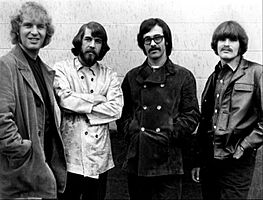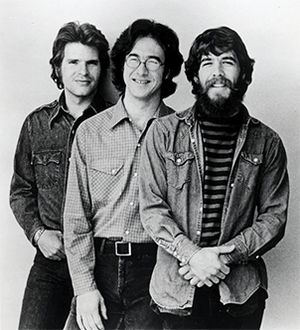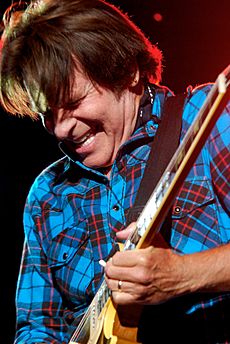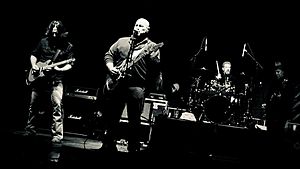Creedence Clearwater Revival facts for kids
Quick facts for kids
Creedence Clearwater Revival
|
|
|---|---|

Creedence Clearwater Revival in 1968. From left to right: Tom Fogerty, Doug Clifford, Stu Cook and John Fogerty
|
|
| Background information | |
| Also known as | The Blue Velvets, Tommy Fogerty and The Blue Velvets (1959–1964), Vision, The Golliwogs (1964–1967) |
| Origin | El Cerrito, California, U.S. |
| Genres |
|
| Years active |
|
| Labels | Fantasy |
| Past members |
|
Creedence Clearwater Revival, often called Creedence or CCR, was a famous American rock band. They started in El Cerrito, California. The band members were John Fogerty (lead singer, guitarist, and main songwriter), his brother Tom Fogerty (rhythm guitarist), Stu Cook (bassist), and Doug Clifford (drummer).
These four musicians played together since 1959. They first called themselves the Blue Velvets, then the Golliwogs. In 1967, they finally became Creedence Clearwater Revival. They even performed at the huge Woodstock Festival in 1969.
CCR had amazing success for about four years. But they broke up in late 1972. Tom Fogerty left the band in 1971. John Fogerty had disagreements with the other members about how the band was run and the music they made. This led to some legal problems later on.
Even though the band never officially got back together, John Fogerty still plays CCR songs in his solo shows. Stu Cook and Doug Clifford have also performed as Creedence Clearwater Revisited since the 1990s.
CCR's music is still very popular on classic rock radio stations in the U.S. Over 30 million CCR records have been sold in the U.S. Their greatest hits album, Chronicle: The 20 Greatest Hits, released in 1976, is still on the Billboard 200 album chart and has sold millions of copies.
Contents
History of Creedence Clearwater Revival
Early Days: The Blue Velvets (1959–1964)
John Fogerty, Doug Clifford, and Stu Cook first met in junior high school in El Cerrito, California. They formed a band called the Blue Velvets. They played instrumental songs and popular tunes from jukeboxes. They also backed up John's older brother, Tom Fogerty, before he officially joined the band.
The band released a few singles. In 1964, they signed with Fantasy Records, a record label in San Francisco. They liked the label because of a successful jazz song they had released.
New Names: Vision and The Golliwogs (1964–1967)
For their first release with Fantasy Records, the co-owner Max Weiss changed their name to The Golliwogs. Before that, he had briefly named them Vision. During this time, the band members changed their roles. Stu Cook started playing bass guitar instead of piano. Tom Fogerty moved from lead vocals to rhythm guitar. John Fogerty became the main singer and songwriter. Tom said that John "had a sound!" that was perfect for singing.
In 1966, John Fogerty and Doug Clifford joined the U.S. armed forces. John joined the U.S. Army Reserve, and Doug joined the U.S. Coast Guard Reserve. John Fogerty eventually took more control of the band. He sang lead vocals and played many instruments like keyboards, harmonica, and saxophone. By 1967, he was also producing the band's recordings.
Becoming Creedence Clearwater Revival (1967–1969)
In 1967, a new owner, Saul Zaentz, bought Fantasy Records. He offered the band a chance to record a full album. The band members never liked the name "The Golliwogs." So, in January 1968, they chose their own name: Creedence Clearwater Revival (CCR).
The name came from three things: a friend of Tom Fogerty named Credence Newball, a TV commercial for "clear water" beer, and the band members' renewed commitment to their music. They thought about other names like "Muddy Rabbit" but settled on CCR.
In early 1968, CCR started playing regularly in clubs around San Francisco. They also began touring across the U.S. and played in New York City.
Radio stations across the U.S. noticed CCR when their cover of "Susie Q" became popular. It was their second single and their first song to reach the Top 40 charts. It was also their only Top 40 hit not written by John Fogerty. They released two more singles from their first album, including "I Put a Spell on You" and "Porterville."
Huge Success: 1969–1970
After their first hit, CCR started touring a lot and working on their second album, Bayou Country, released in January 1969. This album was a big hit and started a two-year period of many successful albums and singles.
The song "Proud Mary" became a huge hit, reaching No. 2 on the Billboard chart. Many other artists have covered this song. John Fogerty said he wrote "Proud Mary" feeling happy after leaving the Army Reserve. The album also included "Good Golly, Miss Molly" and "Keep On Chooglin'."
In April 1969, "Bad Moon Rising" was released and also reached No. 2 in the U.S. In the United Kingdom, "Bad Moon Rising" was a number one hit for three weeks. The band's third album, Green River, came out in August 1969. It was their first album to reach No. 1 on the Billboard charts. The song "Green River" also reached No. 2.
CCR toured constantly, playing at the Atlanta Pop Festival and Woodstock Festival in 1969. Their Woodstock performance was not in the famous film or soundtrack. John Fogerty felt their performance wasn't their best. However, Stu Cook thought it was "classic CCR." John later said the audience seemed tired after the band before them played.
The Rock and Roll Hall of Fame described CCR as a band that was both new and old at the same time. They were different from other bands in San Francisco that played psychedelic music. CCR's music was simple and strong, inspired by artists like Little Richard and Elvis Presley. They helped define "roots rock," which is music that goes back to the basic styles of American music.
After Woodstock, CCR worked on their fourth album, Willy and the Poor Boys, released in November 1969. Songs like "Down on the Corner" and "Fortunate Son" became hits. 1969 was a fantastic year for the band, with three top ten albums and four hit singles.
In January 1970, CCR released another hit, "Travelin' Band"/"Who'll Stop the Rain". "Travelin' Band" sounded a lot like "Good Golly, Miss Molly," which led to a lawsuit that was settled. The band also recorded a live show in Oakland, California. In February, John Fogerty was featured on the cover of Rolling Stone.
In April 1970, CCR went on their first European tour. To prepare, John wrote "Up Around the Bend" and "Run Through the Jungle", which became another hit single. In June, they recorded Cosmo's Factory. This album included earlier hits like "Travelin' Band" and "Up Around the Bend."
Cosmo's Factory was released in July 1970 and was number one in the U.S. for nine weeks. It also had the hit "Lookin' Out My Back Door"/"Long as I Can See the Light". CCR had five No. 2 singles but never a No. 1 hit on the Billboard Hot 100. This is more than most groups.
Other songs on Cosmo's Factory included a long version of "I Heard It Through the Grapevine" and a tribute to Roy Orbison's "Ooby Dooby." This album was their biggest seller.
Pendulum, released in December 1970, was another best-selling album. It featured the hit song "Have You Ever Seen The Rain?" John Fogerty used a Hammond B3 Organ on many songs on Pendulum, showing his respect for the band Booker T. & the M.G.'s. The other side of the single, "Hey Tonight," was also a hit.
Tom Fogerty Leaves, Disagreements, and Break-up: 1971–1972
Around this time, the other band members felt that John was too controlling. Tom Fogerty decided to leave CCR in early 1971 after Pendulum was recorded. His departure was announced in February. The remaining members thought about replacing him but decided to continue as a trio.
In 1971, John Fogerty, tired of his bandmates complaining about not writing their own songs, changed his mind. He told Cook and Clifford that CCR would now be "democratic." Each member would write and perform their own songs, with each contributing three songs to the next album. John would only play guitar on their songs.
There are different stories about how Cook and Clifford felt about this. They had wanted more say in the band's music and business. John Fogerty said they were excited at first but changed their minds when the album wasn't as successful. Other sources suggest they were against it from the start. John supposedly said they had to accept the new plan or he would quit.
Despite the disagreements, the trio released the Top 10 single "Sweet Hitch-Hiker" in July 1971. The band toured the U.S. and Europe that summer and autumn. Even with their continued success, the relationships among the three members became very difficult.
The band's last album, Mardi Gras, was released in April 1972. It included songs written by John Fogerty, Stu Cook, and Doug Clifford. Each member sang lead on their own songs. Critics did not like the album, saying it was uneven and lacked focus. One reviewer called it "the worst album I have ever heard from a major rock band." Sales of Mardi Gras were lower than previous albums, but it still became the band's seventh gold-certified album. John's song "Someday Never Comes" also reached the U.S. Top 40.
By this point, John Fogerty was not only fighting with his bandmates but also felt that their contract with Fantasy Records was unfair. Stu Cook, who had a business degree, said that CCR had one of the worst record deals of any major U.S. artist.
Even with the poor reviews for Mardi Gras and the bad relationships, CCR went on a two-month tour in the U.S. However, on October 16, 1972, Fantasy Records and the band officially announced their breakup. CCR never formally reunited after this. John Fogerty later said that he felt alone when he made CCR's music. He felt he did most of the work, including writing, arranging, and producing. He said the other guys only showed up for rehearsals and recordings. He felt like the band was a "time bomb" because of the disagreements.
After the Breakup
John Fogerty's Solo Career
In 1973, John Fogerty started his solo career with The Blue Ridge Rangers. This album featured him playing all the instruments on country and gospel songs. He still owed Fantasy Records eight more albums from his old CCR contract, but he refused to work for them. This problem was solved when another record company bought his contract.
In 1975, he released his self-titled album, John Fogerty. His next big hit was Centerfield in 1985, which topped the charts. On tour in 1986, Fogerty faced complaints for not playing CCR songs. He also had vocal problems, which he blamed on having to testify in court. He explained that he would have to pay money to the copyright owner if he played CCR songs, and it was "too painful" to revisit that music.
With the Centerfield album, Fogerty also had new legal issues. He was sued for a song that sounded like one of his old CCR songs. Since he had given up his rights to CCR songs, the record company now owned the old song and sued him for copying himself. A jury decided in Fogerty's favor.
On February 19, 1987, John Fogerty finally started playing CCR hits again. Other famous musicians like Bob Dylan and George Harrison encouraged him. At a concert for Vietnam veterans in 1987, Fogerty played many CCR hits. He released another album in 1986, Eye of the Zombie. He took a break from music but returned in 1997 with the Grammy-winning album Blue Moon Swamp. John Fogerty still tours and performs both CCR classics and his solo material.
Tom Fogerty's Solo Work
Tom Fogerty released several solo albums, but none were as successful as CCR's. His 1974 album Zephyr National was the last time all four original CCR members played together on a record. Some songs on it sounded very much like CCR's style.
Tom Fogerty passed away in September 1990 due to health issues. He and John had barely made up before Tom's death. At Tom's funeral, John said they had wanted to be musicians and rock stars, and they achieved half of that.
Stu Cook and Doug Clifford's Projects
Doug Clifford and Stu Cook, who were friends since junior high, continued to work together after CCR broke up. They played as session musicians and were in the Don Harrison Band. They also started a mobile recording service. Clifford released a solo album called Cosmo in 1972. Cook produced music for other artists and played bass for the country band Southern Pacific in the 1980s.
Clifford also produced an album for Doug Sahm, and both Clifford and Cook played on it. Clifford continued to perform with Sahm for many years.
After a long break from music, Cook and Clifford formed Creedence Clearwater Revisited in 1995 with other musicians. Revisited still tours globally, playing the original band's classic songs. John Fogerty tried to stop them from using the name, but the courts ruled in Cook's and Clifford's favor.
Fantasy Records After CCR
After CCR broke up, Fantasy Records released several greatest hits albums. These included Creedence Gold (1972), More Creedence Gold (1973), and Pre-Creedence (1975), which was a collection of the Golliwogs' early recordings. Fantasy also released the very successful double album Chronicle in 1976, which had twenty of Creedence's hit singles.
The success of CCR made a lot of money for Fantasy Records and its owner, Saul Zaentz. Zaentz used his wealth to produce many successful films, including movies that won Best Picture Oscars. In 2004, he sold Fantasy Records. The new owners, Concord Records, honored the old promises Fantasy had made to CCR. They finally paid CCR a higher royalty rate and gave John Fogerty back ownership of his songs.
John, seeing that Zaentz was no longer involved, signed a new contract with Concord/Fantasy. In 2005, they released The Long Road Home, a collection of CCR and Fogerty solo songs. Later, John Fogerty switched to his own record label.
Band Reunions
The original CCR members rarely reunited after they broke up. All four members played on Tom Fogerty's 1974 album and at his wedding in 1980. John, Cook, and Clifford played together at their high school reunion in 1983, but as their first band, the Blue Velvets.
In the 1980s and 1990s, more lawsuits between the band members and their former management made their disagreements worse. When CCR was inducted into the Rock and Roll Hall of Fame in 1993, John Fogerty refused to perform with Cook and Clifford. They were not allowed on stage, and John played with other famous musicians. Tom's widow had hoped for a reunion and even brought his ashes to the ceremony. Cook and Clifford were very upset and left the event.
In a 2011 interview, John Fogerty said he might consider reuniting with Cook and Clifford, saying "Never say never." However, Cook and Clifford both said in 2012 that they were not interested. Cook said, "Leopards don't change their spots." Clifford added, "It might have been a nice idea twenty years ago, but it's too late."
In 2013, Fogerty again said he was open to a reunion, but he didn't think Cook and Clifford would change their minds. In 2017, Clifford again said there was no chance of a reunion, stating, "It's way too late now."
Legal Rights and Music Use
CCR's songs are often used in movies and commercials. This is partly because John Fogerty signed away control of his early recordings to Fantasy Records. John Fogerty has said he didn't like how his music was used.
For example, his protest song "Fortunate Son" was used in a blue jeans commercial. John Fogerty was very against this. He told a newspaper that he hated his song being used to sell pants. To their credit, the company stopped using the song after hearing his feelings.
CCR's Music Style and Influences
CCR's music style included many types of rock, like swamp rock, country rock, roots rock, rockabilly, and blues. They are known for being pioneers of swamp rock and country rock.
Even though the band was from California, their songs often had lyrics about bayous, catfish, and the Mississippi River, which are parts of the Southern U.S. Their songs rarely focused on romantic love. Instead, they often had political and social messages, like those about the Vietnam War.
CCR's Legacy
Rolling Stone magazine ranked CCR as the 82nd greatest artist of all time. In 2003, Rolling Stone included three of their albums on its list of the 500 Greatest Albums of All Time: Green River, Cosmo's Factory, and Willy and the Poor Boys.
In 2004, Rolling Stone also listed four of their songs on its 500 Greatest Songs of All Time: "Fortunate Son", "Proud Mary", "Who'll Stop the Rain", and "Bad Moon Rising".
"Fortunate Son" was added to the Library of Congress' National Recording Registry in 2013. This list includes recordings that are important culturally, historically, or artistically.
"Fortunate Son", "Proud Mary", and Cosmo's Factory have all been added to the Grammy Hall of Fame. "Proud Mary" is ranked high on VH1's "100 Greatest Rock Songs" list. "Bad Moon Rising" is also on NME's "500 Greatest Songs of All Time" list.
Band Members
- Doug Clifford – drums, percussion, backing and occasional lead vocals (1959–1972)
- Stu Cook – bass guitar, backing and occasional lead vocals, keyboards (1959–1972)
- John Fogerty – lead vocals, lead guitar, keyboards, harmonica, saxophone (1959–1972)
- Tom Fogerty – rhythm guitar, backing and lead vocals (1959–1971; died 1990)
CCR Discography
|
Studio Albums
|
See also
|
Images for kids
See also
 In Spanish: Creedence Clearwater Revival para niños
In Spanish: Creedence Clearwater Revival para niños
 | Delilah Pierce |
 | Gordon Parks |
 | Augusta Savage |
 | Charles Ethan Porter |





